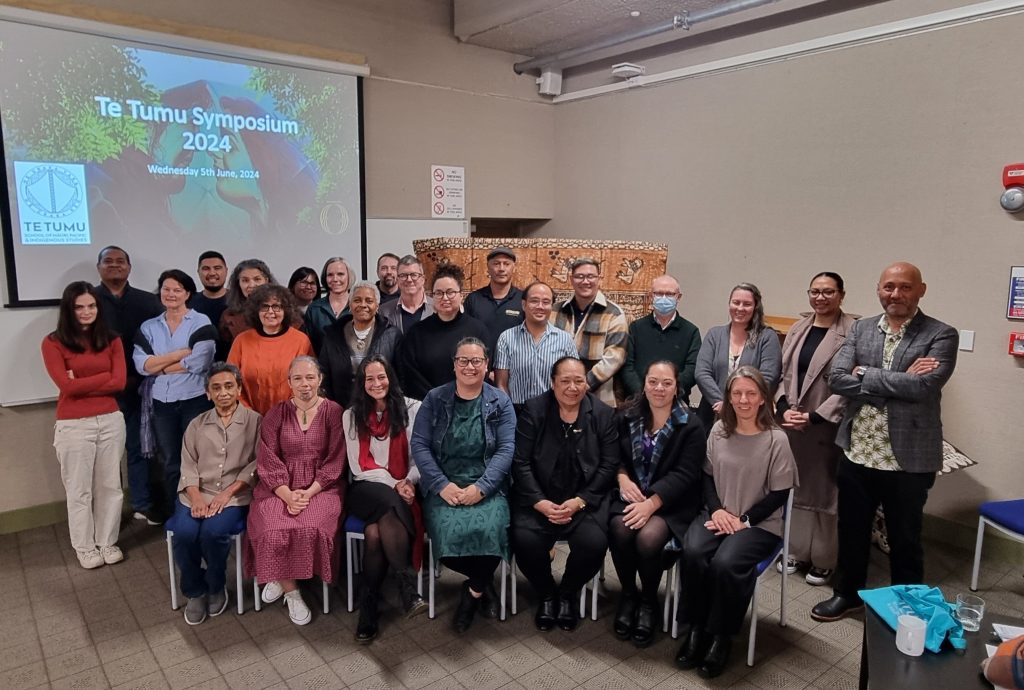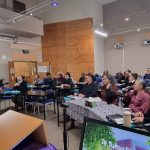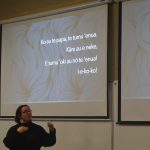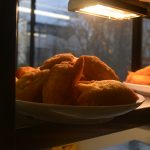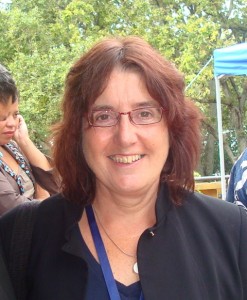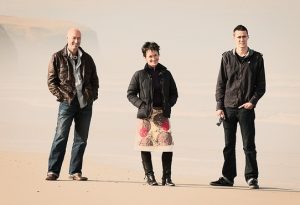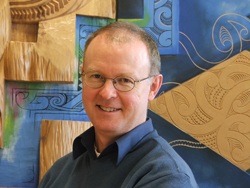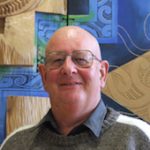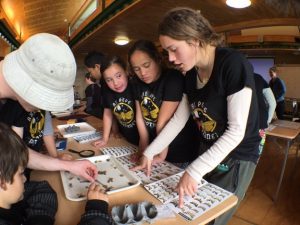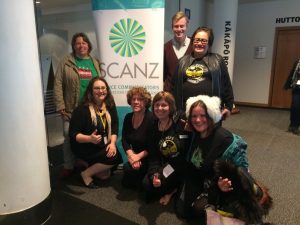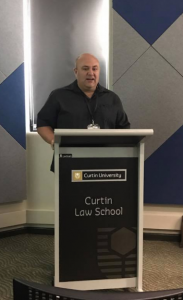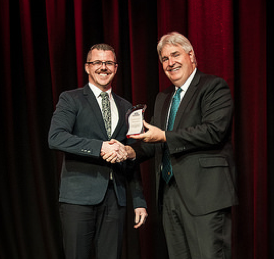Inaugural Te Tumu Symposium a showcase of diverse research excellence
On Wednesday 5 June, Te Tumu, School of Māori, Pacific and Indigenous Studies, hosted its inaugural research symposium to share and celebrate research from Te Tumu. The day began with a welcome from Te Tumu Dean Prof Patrick Vakaoti and a history of Te Tumu from Prof Michael Reilly. The programme included four sessions of Te Tumu staff and postgraduate students’ presentations, constructive question and answers segments, feedback, and encouragement.
Supported by Te Tumu’s Research Committee and Postgraduate Committee, the event welcomed attendance from those who are based in Ōtepoti, as well as distance students who are based in Te Whanganui ā Tara, and as far afield as New Caledonia. With special Tītī and fry bread kai, this gathering was truly an inspiring occasion and speaks to exciting research work that Te Tumu staff and students are doing locally, and regionally that are important contributions for their communities, and for the growth of Māori, Pacific and Indigenous Studies scholarship.
Session 1 was facilitated by Dr Paerau Warbrick, a lecturer in Māori Studies, and included presentations by Te Tumu staff member Paia Taani on intergenerational language transmission; and PhD students, Jenni Tupu who presented about transracial adoption, and Ella Cameron-Smith who presented on Ngaati Korokii Kahukura kai identities.
Session 2 was facilitated by Dr Telesia Kalavite, a lecturer in Pacific Studies, and included presentations by four PhD students: Frédéric Dichtel who presented on te reo grammatical structures; Regina Maniam who presented on engaging Indigenous values and methods in doctoral research; Stacey Kokaua-Balfour who presented on Cook Islands’ creative texts relating to the environment and climate change; and Jay Quintos who presented on critical perspectives on films about the Tboli people in the Philippines.
Session 3 was facilitated by Prof Michael Reilly, the Postgraduate Chair of Te Tumu. The session included staff member Prof Richard Jackson who presented on non-violent approaches to counterterrorism, and two PhD students: Jude Bautista who presented on visual social semiotics and critical lenses in discourse analyses; Kim Cope Tait who presented on personal sovereignty in the poetry of Hinemoana Baker.
Session 4 was facilitated by Dr Emma Powell, lecturer in Indigenous Studies and Programme Coordinator of the Master of Indigenous Studies (MIndS). The session included three MIndS distance students: Melissa Denzler, based in Te Whanganui ā Tara who presented on the cultural taxation of kaiako Māori; Elizabeth Hamilton, based in Whakatū, who presented on a approach for honouring Te Tiriti specifically relating to language learning policies for migrants and former refugees; and James Uri-Puati, based in the Cook Islands, who presented on a critical Indigenous framework for theorising second language learning.
Te Hau Kāinga Summer Scholarships
Are you a Māori university student? Would you like to a do a research project over summer – and get paid for it? The Te Hau Kāinga: Māori Home Front project has three summer scholarships available, starting in December. Under supervision, you can develop your own research project in your own home area, whether a historical report, a mōteatea, a video, or such like – something that you can share with your whānau and community. Or you can undertake a project with one of our partner institutions. If you’re keen and interested, read the information and get in touch! If you know of someone who might be interested, please pass this on to them.
2020/2021 Summer Scholarships
Te Hau Kāinga is a University of Otago-based research project supported by the Marsden Fund to investigate Māori experiences within New Zealand during World War Two. The project is offering three summer scholarships for 2020/2021 for Māori students in their second year or above enrolled at a New Zealand university. The purpose of the scholarships is to enable a promising student the opportunity to undertake sustained research work over the summer period.
Under the supervision of the project leaders, successful applicants will get to design their own projects and outputs, in English, i roto i te reo Māori rānei, which may include (but not be limited to) a written history, waiata, exhibition, or artwork that can be shared with whānau. Alternatively, Te Hau Kāinga can suggest a suitable research project, perhaps based in one of our partner institutions. Depending on the nature of the proposed research, successful candidates can be based anywhere within New Zealand. Summer scholarship recipients will also be involved in public initiatives designed to showcase the project to the wider community, including writing a blog post about their research.
Conditions
- Each scholarship has a value of $5,000 to be paid as a stipend in four instalments directly to the student’s nominated bank account (see details of payment dates and conditions below). Extra funding for travel or other expenses will be available if required.
- The student is expected to contribute a minimum of 400 hours (or ten weeks) to the project, starting in December.
- The approved research project will take place, exclusive of vacation time, between December 2020 and February 2021.
- All applications and associated documents must be submitted by 5pm Thursday 1 October 2020. These will include: a brief curriculum vitae (including a statement detailing any research experience to date, and contact details for two academic referees) and an academic transcript. If you have your own ideas about what you would like to research, please also attach a one-page research plan.
- The successful applicant will be a student of New Zealand Māori descent who was studying at 200 level or higher in 2020, and who will be enrolling for study at Otago or another New Zealand university in 2021. Applicants with suitable skills and a background in the humanities and/or the social sciences are eligible. Students considering enrolling in a postgraduate degree, typically an Honours, Masters or PhD programme, are especially welcome to apply.
- Summer Scholarships are not to be used to fund student research being undertaken for credit towards a degree/diploma.
- The student must not be receiving alternative scholarship support for the same project or any other project over the same timeframe. The student may hold only one Summer Scholarship in total.
- Students who currently hold a PhD or Master’s Scholarship are not eligible for a Summer Scholarship. Students with one of these scholarships and who are on a deferral over the summer period are also not eligible for a Summer Scholarship.
- The studentship will be paid by the University of Otago Scholarships Office in three instalments of $1,500 with a final $500 payment in March providing a satisfactory report on the project is received no later than 28 February 2021.
To discuss the scholarship and possible projects please contact the project leaders: info@maorihomefront.nz.
If you wish to apply, complete and submit this Te Hau Kāinga application form.
Check out the research outputs of previous summer scholarship recipients.
Connor Aston, Ngāti Ruanui (Waikato University) For Kīngi and Country: Waikato During the Second World War.
Dylan Thomas, Raukawa, Hauraki (University of Otago) Māori and Hockey: More than a Game.
Jordan Quinnell, Ngā Ruahine, Taranaki, Tūwharetoa (Massey University) [Artworks]
https://www.maorihomefront.nz/en/whanau-stories/the-trench-digger/
https://www.maorihomefront.nz/en/whanau-stories/jordans-second-image/
For further information on the Te Hau Kāinga project, please see: https://www.maorihomefront.nz/
Project Leaders: Professor Lachy Paterson,
Te Tumu: School of Māori, Pacific & Indigenous Studies
University of Otago.
Ph: 03-479-8462
Associate Professor Angela Wanhalla,
History Programme,
University of Otago.
Ph: 03-479-8462
3 Summer Scholarships for Māori students
The Te Hau Kāinga team are looking for three Māori students (second year or higher in 2019) for some amazing research-based work over the 2019-2020 summer break. There are two main options. One is to develop a project in your home area to look at how the Second World War affected the whānau and communities there. The output can be a written report, a mōteatea, a video (or something else) that can be shared with your whānau. The other is to undertake archival research within an archive, such as the Hocken Collections, or Ngā Taonga Sound and Vision. If you are curious, or want to discuss an idea, or find out more, contact the project leaders. Click here for more information, or to apply.
Ngā Pae o te Māramatanga Summer Internships
Are you a Māori pre-doctoral student who is interested in advancing your skills and capacity in Indigenous research, and wanting some paid work over summer? Or do you know someone who may be interested? Ngā Pae o te Māramatanga have 27 Summer Internships on offer. Closes 10 October.
**** CLICK HERE TO FIND OUT MORE ****
Rangahau Roundup
Semester 2 has been busy on the research front for Te Tumu staff and postgrads.
Te Tumu is still progressing with Te Kōparapara, a book on Māori culture, history and contemporary society, which is designed as a textbook for MAOR102 as well as for a general audience. Prof Michael Reilly is the main driver of this project, and has been ably assisted by Dr Gianna Leoni. This book, with an array of essays mainly written by Te Tumu staff, is under contract with Auckland University Press and should appear sometime in 2017.
Faculty News
Associate Prof Jenny Bryant-Tokalau has been having a busy Research and Study Leave. She has given two presentations in the USA in the last semester: ‘Food security and other risks in a time of climate change: traditional and contemporary forms of resilience’, to the Department of Anthropology, and ‘Small Island Pacific States: Dealing with Climate Change’ to the Department of Geology at Wheaton College in Massachusetts. In December she presented ‘Working in Context: The Commercial Potential of Customary Pacific Land’ at the Aotearoa New Zealand International Development Studies Network Ninth Biennial Conference ‘Pacific Currents, Global Tides’ Wellington, and ‘Dealing with disasters and social change’ to the Asia Pacific Biocultural Health ‘Big Ideas’ Workshop, in Dunedin, December.
Jenny has also had one chapter in an edited collection appear during this period: ‘Community responses to floods in Fiji: lessons learned’ In Calabrese, John (ed.) Humanitarian Assistance and Disaster Response: Rising to the Challenge. MAP Series, Middle East Institute, Washington. August (2016) issue. Click here to access it. She also has two book reviews published in New Zealand and Pacific Studies November, 2016; and Journal of the Polynesian Society 125 (1), 2016.
Jenny is planning to return to the Solomon Islands to carry out in-depth interviews on small and medium businesses on Kastom land, as well as to finalise book edits for Palgrave MacMillan Anthropology of Disaster Series: What the Pacific Islands can teach New Zealand about Climate Change.
As previous posted, Prof Paul Tapsell spoke at the Indigenous Plenary at the WAC-8 Conference in September. Paul and Associate Prof Merata Kawharu are also part of the large three-year Mauri-Whenua-Ora project within the National Science Challenge Land and Water: Toitū te Whenua, Toiora te Wai. This project is the only fully Māori-led and Māori-integrated research programmes of all NSCs nationally, and is looking at Maori land and water based innovation including: (1) micro economy development “Pa to Plate”, (2) Shared iwi innovation for Taitokerau as a model for other iwi and (3) a regional (Te Hiku) study looking at Maori land suitable use and value chains. Merata also has a forthcoming publication, “Indigenous Entrepreneurship: Cultural Coding and the Transformation of Ngāti Whātua in New Zealand” in the Journal of the Polynesian Society, 125, 4 (2016): 385-408.
Associate Prof Lachy Paterson gave a presentation entitled ‘U.S. Slave “Humor” in New Zealand Newspapers’ at the 109th Annual Meeting of the Pacific Coast Branch of the American Historical Association at Waikoloa, Hawai’i. He is currently writing up this paper, which looked at how imported racist discourses permeated New Zealand’s English-language newspapers. Lachy returned to his ongoing obsession with Māori-language newspapers, with “The New Zealand Government’s Niupepa and their Demise” published in the New Zealand Journal of History, 50, 2 (2016): 44-67.
Together with Associate Prof Angela Wanhalla (Dept of History and Art History), he has also sent off their manuscript “He Reo Wahine: Māori Women’s Voices from the Nineteenth Century” to Auckland University Press, and it should appear sometime in 2017.
Over summer Prof Michael Reilly hopes to write a paper concerning the research relationship between William Wyatt Gill of the London Missionary Society, and Mamae of Ngāti Vara, a church minister, on Mangaia during the 19th century. In the longer run, he wants to begin writing chapters for an introduction to Māori tribal history, drawing from the draft text used as a ‘course reader’ in MAOR 207 Ngā Kōrero Nehe – Tribal Histories. Michael is passionate about this project but acknowledges that it may take several years to finish. He has also completed the final editorial corrections for a paper to be published this December, “Narrative Features and Cultural Motifs in a Cautionary Tradition from Mangaia (Cook Islands)”, in the Journal of the Polynesian Society 125, 4 (2016): 357-384.
Dr Jim Williams has a forthcoming article in the Journal of the Polynesian Society, entitled “Seafood Gardens”. Jim has a busy summer planned, fininishing off an essay for Ethnohistory, entitled “Layers of History” explaining how certain activities are repeated at powerful places, giving rise to notions of circularity of time, but layered, like whakapapa; he will also be giving a presentation in January at the American Historical Association conference in Denver. One of Jim’s students, Katrina Bryant, has just completed her Master of Physiotherapy.
In October newly graduated Dr Gianna Leoni gained a new position based in Te Tumu, that of a Ngā Pae o te Māramatanga postdoctoral fellow, with the research project “Te Ōhanga o te Pīpīwharauroa – Expressing our Economic Aspirations”. Click here for more details.
 In June, Megan Pōtiki presented on her doctoral research on language loss at Ōtākou, at He Rau Tumu Kōrero IX at Te Rau Aroha Marae in Bluff. This event was run by Te Pouhere Kōrero, the national Māori historians organisation. Megan has also published two journal articles, “The Otago Peninsula: A unique identity” in Shima, 10, 1 (2016): 67-84 [Potiki-Shima-v10n1-3]; and ‘Te Haka Nā Ngā Herehere’ in Te Pouhere Kōrero 8 (2016): 6 –25, and is currently working on another article, “Māori song composition and reclamation of traditional tribal borders” based on a mōteatea she composed for the Te Tumu Kapa Haka group.
In June, Megan Pōtiki presented on her doctoral research on language loss at Ōtākou, at He Rau Tumu Kōrero IX at Te Rau Aroha Marae in Bluff. This event was run by Te Pouhere Kōrero, the national Māori historians organisation. Megan has also published two journal articles, “The Otago Peninsula: A unique identity” in Shima, 10, 1 (2016): 67-84 [Potiki-Shima-v10n1-3]; and ‘Te Haka Nā Ngā Herehere’ in Te Pouhere Kōrero 8 (2016): 6 –25, and is currently working on another article, “Māori song composition and reclamation of traditional tribal borders” based on a mōteatea she composed for the Te Tumu Kapa Haka group.
As part of Māori language week this year Tangiwai Rewi was asked to give a Library research floor talk on Wednesday 13 July on the Ngāruawāhia Turangawaewae regatta, which comes out of her doctoral research and an article last year in the Journal of the Polynesian Society. A display themed around the article was shown in the Hocken Collections for seven weeks as part of Māori language Week. Click here for more details and pictures.
Tangiwai has participated in the Ahi Pepe Resource launch 27 October and Wānanga 26-28 October. She was a collaborator in this project which created an immersion te reo Māori Moths resource depicting the 600+ species endemic to the South Island. Twelve schools were invited to the Wānanga, to participate, learn how to trap, kill and present moths for identification and preservation. Also launched that night were the bilingual and total immersion resource covering the four areas of the South Island.
Tangiwai also attended the SCANZ (Science Communicators Association NZ) conference on 14 November as part of the panel who discussed the resource and preservation of moths.
Tangiwai went north to attend the Te Awamārahi poukai on 24 November. (Poukai are ceremonial gatherings held on Kīngitanga marae.) This was an opportunity to take the photo display back to her marae especially as some of people featured in the photos come from that marae. The photo boards were put on display along with other harakeke resources found along the riverbanks. Needless to say, Tangiwai also vigorously promoted Te Tumu and the University of Otago to all the people who came to view the display.
Postgraduate News
Congratulations to Matangi Schaaf who graduates in December with a PhD; and also to Nikki Walden (Taranaki, Te Āti Awa) and Nurul Sultan with Master of Indigenous Studies degrees. Click here for more details.
Two of our PhD students are submitting in December: John Birnie and Taomi Qiliho-Tapu, and Tāwini White (Ngāi Tahu, Te Rarawa) is making the final amendments to her MA thesis. Rieko Hayakawa‘s PhD thesis ‘Possibility of Telecommunication Universal Service in the Pacific Islands; Case studies of Vanuatu, PEACESAT and USPNet’ has just passed examination. We look forward to these students graduating in the near future.
We have a new PhD student who has just started, Raaniera Te Whata (Ngāpuhi, Ngāti Porou, te Whānau a Apanui), researching communities-based Māori land development in the Bay of Islands. Raaniera comes into doctoral studies after completing an LLB in Auckland and a Master of Indigenous Studies in Te Tumu.
In August Erica Newman who is undertaking PhD research on Fijian Orphanages (1874-1970) presented at the Anthropology and Archaeology Postgraduate Symposium held here in Dunedin.
Matiu Payne (Ngāi Tahu, Ngāti Mutunga), who is researching the impact of government agencies on tikanga whāngai for his doctoral studies, has just been to the Australia New Zealand Law and History Society conference at Curtin University in Perth presenting on his PhD research.
Kelli Te Maihāroa (Waitaha) who is researching Māori peace traditions and their relevance to whānau today, has co-edited an edited collection: H. Devere, K. Te Maihāroa, & J.P. Synott (eds.) Peacebuilding and the Rights of Indigenous Peoples: Experiences and Strategies for the 21st Century, (Springer: Cham, Switzerland, 2016), which includes two co-written and one sole-authored articles by Kelli. She also has an article forthcoming, “Whanaungatanga: Relationships in a One Day Te Reo Māori School of Excellence” in Theobald, M. (Ed.) Friendships in Multilingual Settings (Sociological Studies of Children and Youth, Vol 21 (2016)). Emerald. Kelli, who is a lecturer in the College of Education, also presented at the Teacher Education Forum of Aotearoa New Zealand, in June/July in Dunedin, and at International Indigenous Research Conference in November in Auckland.
Three Items
The Puke Ariki Trust Scholarship, valued at $5000, supports the studies of a postgraduate student whose research relates to Taranaki’s social history. Puke Ariki is Taranaki’s Museum, Library, Archive Centre based in New Plymouth, renowned for its extensive heritage collections. If you are interested in this scholarship, check out the Puke Ariki Trust Scholarship Terms and Conditions.
Associate Professor Jenny Bryant-Tokalau presented a paper to the conference ‘Islands and Oceans: Navigating Pacific Futures’ held at Auckland University, November 12-13th 2015. Jenny’s paper, entitled ‘Reforming Land Tenure in the Pacific: requirements and implications, the case of Fiji’, was chaired by former Oxfam director Barry Coates, and was part of an intensive two day workshop between University of Auckland (Pacific Studies), Auckland University of Technology, Australian National University and the University of Otago to look at areas of collaborative Pacific research.
Te Tumu PhD student Nathan Albury recently was awarded the Griffith University School of Language and Linguistics Outstanding Alumnus Award in recognition of his PhD research into folk linguistics for Te Reo Maori and Sami language. Nathan is completing his PhD at the Centre for Multilingualism in Society Across the lifespan – MultiLing (CoE), Department of Linguistics and Scandavian Studies, University of Oslo,with Dr Lyn Carter (Te Tumu) as one of the supervisors.

